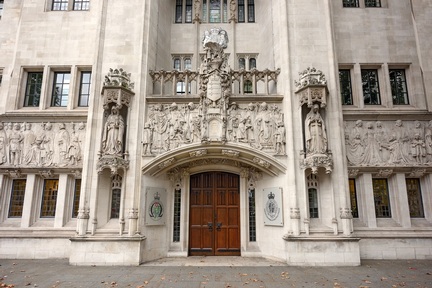Supreme Court rules on 'vegetative state' case
The Supreme Court, the highest court in the land, has ruled a patient in a ‘vegetative state’ should be able to die without the need for approval of a judge.

The Supreme Court upheld a previous High Court decision to allow a severely brain-damaged man to die without his family having to appear before the Court of Protection, which for the past 25 years has made decisions on behalf of those who lack the mental capacity to do so for themselves.
Lady Black, who delivered today’s judgement said: “If the provisions of the Mental Capacity Act are followed and the relevant guidance observed, and if there is agreement upon what is in the best interests of the patient, the patient may be treated in accordance with that agreement without application to the court".
But, she also stipulated there would still be exceptions whereby it would be necessary to have the input of a court.
The ruling related to a Mr Y, a 52-year-old former financial adviser, who was brain damaged after experiencing a cardiac arrest. Afterwards, the patient didn’t regain consciousness and instead required Clinically Assisted Nutrition and Hydration (CANH) to keep him alive. Denying Mr Y access to CANH would essentially mean having his feeding tubes removed.
The patient's treating physician concluded, even if he regained consciousness, the patient would have profound disability and would be dependent on others to care for him for his remaining life.
In November 2017, the High Court judge ruled it wasn’t mandatory to go before the court for the withdrawal of CANH from Mr Y as there was no dispute between his relatives and medical specialists. He passed away in December 2017, but his family wanted to continue the case to help others in a similar situation.
Natalie Koussa, director of partnerships and services at Compassion in Dying, said: “We welcome the Supreme Court’s decision today, which brings much-needed clarity to doctors and loved ones of those who have sadly been left in a vegetative or minimally conscious state following severe illness or injury.
“Today’s judgment is an important move towards more person-centred care, because it means that what’s best for the individual can be decided by their medical team and loved ones, and acted upon more quickly, rather than spending months or even years waiting for a court decision.
“The court’s decision today also recognises the fact that sometimes, sadly, it is in someone’s best interests to withdraw treatment. It will allow those closest to a person – their loved ones and medical team – to feel supported and empowered to make the right decision for the person, even when it is a difficult one.”
Not everyone is pleased about the ruling, however. Dr Peter Saunders, campaign director of the anti assisted-dying group, Care Not Killing, said: 'This is concerning and disappointing news, because it removes an important safeguard from those without a voice.
"The Court of Protection did not prevent clinically assisted nutrition and hydration or CANH being removed, indeed under the old rules, introduced after the Tony Bland case in 1993 there have been over 100 such cases, but it did ensure independent scrutiny of any application. It did this because it recognised the emotional and financial pressure that families and clinicians can fall under.
"In making these declarations Lady Black and the Supreme Court has dramatically moved the goalposts on end of life decision-making. Once we accept that death by dehydration is in some brain-damaged people's 'best interests' we are on a very slippery slope indeed."
Latest News
 29-Jul-24
Dementia Bus gives carehome.co.uk staff insight into life with dementia
29-Jul-24
Dementia Bus gives carehome.co.uk staff insight into life with dementia
 27-Jul-23
UK's top home care agencies in 2023 revealed
27-Jul-23
UK's top home care agencies in 2023 revealed
 30-Nov-22
A quarter of older people keep their falls secret from family
30-Nov-22
A quarter of older people keep their falls secret from family
 29-Nov-22
'Covid-19 has not gone away' say terminally ill
29-Nov-22
'Covid-19 has not gone away' say terminally ill
 28-Nov-22
IT consultant who received poor care opens 'compassionate' home care business
28-Nov-22
IT consultant who received poor care opens 'compassionate' home care business